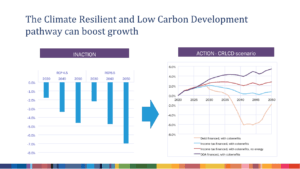A new report on Ghana by the World Bank – dubbed the Country Climate and Development Report (CCDR) – has estimated that at least one million additional people could become poor as a result of climate shocks. For disadvantaged households, income reductions of up to 40 percent may occur by 2050.
According to the Bank’s analysis, until 2050 the cost of addressing climate change will be roughly US$2billion (in present value); which is equal to two-three percent of GDP over that time period.
In a bid to address climate change problems amid high debt and tight budgetary restrictions, the World Bank says the country will need to carefully prioritise investments starting from no-regret actions which maximise resilience benefits at an affordable cost.
“Ghana will need to carefully prioritise investments – starting from no-regret actions that maximise resilience benefits at an affordable cost. The country will need to take urgent actions to restore macroeconomic stability and debt sustainability, and improve the business-enabling environment to mobilise funds from various sources – including private and development finance,” said Pierre Laporte, World Bank Country Director for Ghana, Liberia and Sierra Leone.
“The report demonstrates that Ghana can simultaneously pursue its long-term development and climate goals,” says the Country Director, adding: “Ghana’s contribution to global greenhouse gases emissions is small, with emissions on a per capita basis at 24 percent of the global average. The country can take a more resilient development pathway, avoiding costly lock-ins, leapfrogging to cutting-edge technologies, and starting to mobilise climate finance.”
The report emphasises the part that the financial industry can play in maximising chances for green and blue bonds, insurance and other financial protection mechanisms which can address climate and disaster risks. To support public good initiatives, concessional financing and international development aid will be essential.
“The report shows that the private sector can lead Ghana’s green growth through areas such as green building, renewable energy, climate-smart agriculture and energy efficiency improvements, which IFC is supporting by increasing investment and advisory services to such ventures,” says Kyle F. Kelhofer, IFC’s Senior Country Manager for Benin, Ghana, Guinea and Togo.
“To reduce impacts on the poor, Ghana will need to focus on improving responsive social protection systems and safety nets for vulnerable groups, strengthening financial inclusion, and building skills for new green jobs and livelihoods,” he added.
The report demonstrates how choosing a low-carbon, climate-resilient route might transform obstacles into opportunities by generating over US$26billion in economic gains by 2040.

Priority Areas for Climate Resilience
In order to promote more environmentally friendly, resilient and equitable growth in the nation, the report identifies six priority areas for a climate resilient and low carbon development route. By encouraging integrated landscape management, promoting climate-smart agriculture and aiding coastal communities in adapting, the adoption of an integrated approach to agriculture and environmental management is the first priority area.
The second priority area is dedicated to improving urban development, resilient mobility infrastructure and services, and waste management in order to create sustainable cities and resilient infrastructure systems.
The research also highlights the need for improved national financial-readiness for climate shocks, adaptable health and social protection systems, and an increase in catastrophe risk-preparedness through early warning systems.
It exhorts people to make use of new options for managing forest resources as a means of coping with climate change, including carbon sinks that concentrate on halting deforestation and promoting healthier cooking.
Promoting a shift to clean energy by expanding renewable energy sources and supporting local energy markets, as well as upgrading transportation infrastructure by, among other things, enhancing public transportation and raising car standards remain vital.










